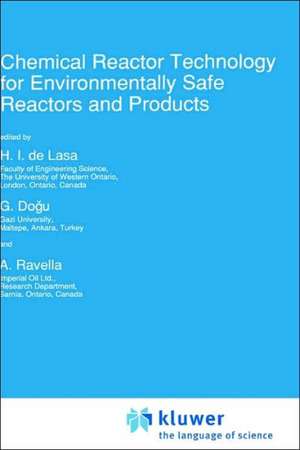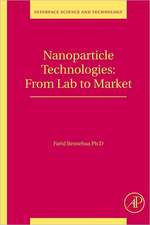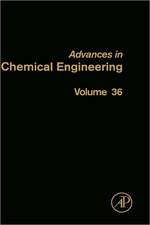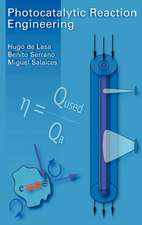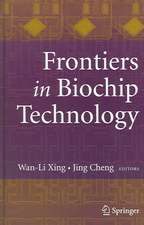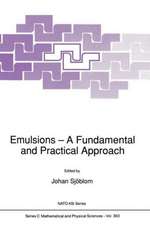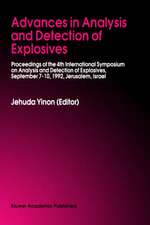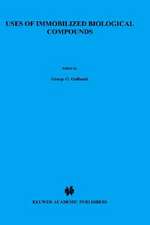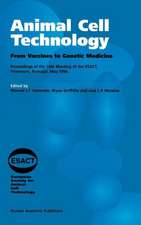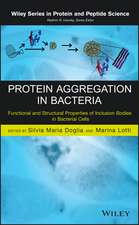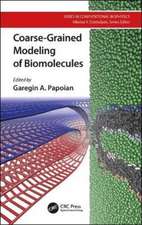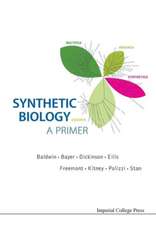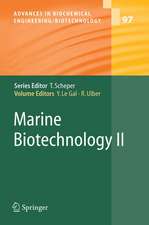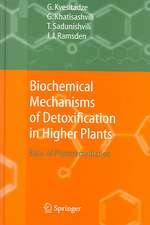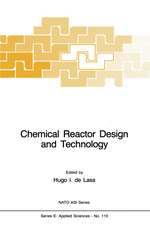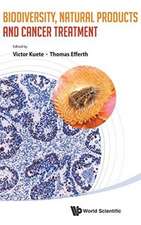Chemical Reactor Technology for Environmentally Safe Reactors and Products: NATO Science Series E:, cartea 225
Editat de Hugo de Lasa, G. Dogammau, A. Ravellaen Limba Engleză Hardback – 30 noi 1992
Chemical Reactor Technology for Environmentally Safe Reactors and Products addresses these issues in three parts: I -- Fuels of the Future and Changing Fuel Needs; II -- Alternative Sources; III -- Emission Control, Chemical Reactor Safety and Engineering. Attention is also paid, throughout the text, to the fundamental technological aspects of reactor engineering and to possible strategies for bridging knowledge gaps.
| Toate formatele și edițiile | Preț | Express |
|---|---|---|
| Paperback (1) | 1833.16 lei 43-57 zile | |
| SPRINGER NETHERLANDS – 8 oct 2012 | 1833.16 lei 43-57 zile | |
| Hardback (1) | 1841.36 lei 43-57 zile | |
| SPRINGER NETHERLANDS – 30 noi 1992 | 1841.36 lei 43-57 zile |
Din seria NATO Science Series E:
- 24%
 Preț: 1570.65 lei
Preț: 1570.65 lei -
 Preț: 397.76 lei
Preț: 397.76 lei -
 Preț: 386.81 lei
Preț: 386.81 lei - 20%
 Preț: 346.24 lei
Preț: 346.24 lei -
 Preț: 424.33 lei
Preț: 424.33 lei - 18%
 Preț: 1224.18 lei
Preț: 1224.18 lei - 18%
 Preț: 1836.63 lei
Preț: 1836.63 lei - 18%
 Preț: 1229.28 lei
Preț: 1229.28 lei -
 Preț: 381.00 lei
Preț: 381.00 lei -
 Preț: 409.30 lei
Preț: 409.30 lei - 18%
 Preț: 1841.36 lei
Preț: 1841.36 lei - 5%
 Preț: 367.28 lei
Preț: 367.28 lei -
 Preț: 407.19 lei
Preț: 407.19 lei - 18%
 Preț: 1838.38 lei
Preț: 1838.38 lei -
 Preț: 420.28 lei
Preț: 420.28 lei -
 Preț: 399.29 lei
Preț: 399.29 lei -
 Preț: 398.74 lei
Preț: 398.74 lei - 18%
 Preț: 3026.13 lei
Preț: 3026.13 lei -
 Preț: 388.90 lei
Preț: 388.90 lei - 5%
 Preț: 391.06 lei
Preț: 391.06 lei - 18%
 Preț: 1228.62 lei
Preț: 1228.62 lei - 18%
 Preț: 1229.73 lei
Preț: 1229.73 lei - 18%
 Preț: 1234.46 lei
Preț: 1234.46 lei - 5%
 Preț: 3532.05 lei
Preț: 3532.05 lei - 18%
 Preț: 1840.11 lei
Preț: 1840.11 lei - 5%
 Preț: 378.80 lei
Preț: 378.80 lei - 18%
 Preț: 1227.84 lei
Preț: 1227.84 lei -
 Preț: 392.75 lei
Preț: 392.75 lei -
 Preț: 395.63 lei
Preț: 395.63 lei - 18%
 Preț: 2489.30 lei
Preț: 2489.30 lei - 5%
 Preț: 1429.27 lei
Preț: 1429.27 lei -
 Preț: 396.02 lei
Preț: 396.02 lei - 5%
 Preț: 2142.61 lei
Preț: 2142.61 lei - 18%
 Preț: 3049.16 lei
Preț: 3049.16 lei - 18%
 Preț: 1844.54 lei
Preț: 1844.54 lei -
 Preț: 403.53 lei
Preț: 403.53 lei
Preț: 1841.36 lei
Preț vechi: 2245.57 lei
-18% Nou
Puncte Express: 2762
Preț estimativ în valută:
352.33€ • 368.86$ • 291.54£
352.33€ • 368.86$ • 291.54£
Carte tipărită la comandă
Livrare economică 07-21 aprilie
Preluare comenzi: 021 569.72.76
Specificații
ISBN-13: 9780792320326
ISBN-10: 0792320328
Pagini: 642
Ilustrații: XVIII, 642 p.
Dimensiuni: 155 x 235 x 40 mm
Greutate: 1.15 kg
Ediția:1992
Editura: SPRINGER NETHERLANDS
Colecția Springer
Seria NATO Science Series E:
Locul publicării:Dordrecht, Netherlands
ISBN-10: 0792320328
Pagini: 642
Ilustrații: XVIII, 642 p.
Dimensiuni: 155 x 235 x 40 mm
Greutate: 1.15 kg
Ediția:1992
Editura: SPRINGER NETHERLANDS
Colecția Springer
Seria NATO Science Series E:
Locul publicării:Dordrecht, Netherlands
Public țintă
ResearchCuprins
I. Fuels of the Future and Changing Fuel Needs.- How Should Environmentally Benign Gasolines be Formulated?.- Oxygenates as Gasoline Blending Components.- Engineering of Fluidized Catalytic Crackers.- Scientific Aspects of Novel Catalysts for FCC.- Novel Techniques for FCC Catalyst Selection and Kinetic Modelling.- Mixing Patterns in a Novel Riser Simulator.- Chemical Aspects of Clean Fuels Production.- II. Alternative Sources.- Evaluation of Direct Methane Conversion Processes.- Engineering Aspects of the Conversion of Natural Gas Into Middle Distillates.- Steam Reforming Opportunities and Limits of the Technology.- Oxidative Coupling of Methane for the Utilization of Natural Gas.- Dysprosium Oxide for Oxidative Coupling of Methane.- Ultrapyrolysis of Heavy Oils: Reaction Kinetics and Reactor Technology.- Bubble Column Reactors: Some Recent Developments.- Strategies for Low Emissions From Circulating Fluidized Bed Boilers.- Kinetic Modelling of Complex Processes. Thermal Cracking and Catalytic Hydrocracking.- Engineering of Hydrotreating Processes.- III. Emission Control, Chemical Reactor Safety and Engineering.- Thermal Sensitivity and Runaway in Chemical Reacting Systems.- Kinetics of Capture of Sulfur Dioxide and Applications to Flue Gas Desulfurization.- Removal of SO2 with Lime Slurry in a Spray Dryer.- Engineering Aspects of Recirculating Fluidised Bed Combustion.- Application of a Monte Carlo Method to the Solid Flow Pattern Visualization in CFB.- Modeling Catalytic Monoliths for Automobile Emission Control.- Photocatalytic Processes for Destruction of Organic Water Contaminants.- Heterogeneous Photocatalytic Degradation of the Cationic Surfactants Cetyldimethylbenzylammonium Chloride and Cetylpyridinium Chloride.- Progress in the Development of Chlorofluorcarbon (CFC) Alternatives.
